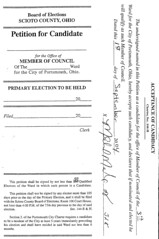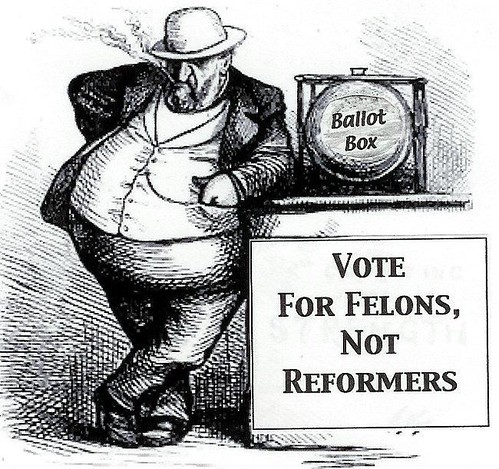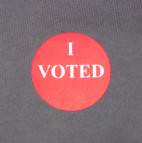
M. Malone Petition for City Council
The tangled legal issue of felons’ rights that I am going to deal with in this blog is difficult to disentangle, and I don’t claim to understand it fully myself. But felons’ rights can affect us all. Keep in mind the removal of felons from voting rolls in Florida is credited by some critics with having won Florida and therefore the presidency for George W. Bush in 2000. We had our own little “felonious election” in Portsmouth in 2004 in which a convicted felon not only voted but ran for public office. He missed being elected to the Portsmouth City Council by only a single vote. Had he won, we might today still be trying to resolve the issue of whether he had a right, as a felon, to remain in the office to which he was elected.
Ohio was in the national news following the 2004 elections because of alleged voting irregularities throughout the state. Minority voters faced various hurdles to voting and getting their votes counted properly. The Democratic staff of the House Judiciary Committee issued a status report “Preserving Democracy: What Went Wrong in Ohio.” One of the irregularities listed in the report was that “Numerous voters were incorrectly listed on the roster as felons and thus not allowed to vote.” The irregularity we had in Portsmouth was just the opposite: a minority candidate with a criminal background was allowed and perhaps encourage to run for public office because he could be expected to support the over-privileged white elite who control the city. In the stealth campaign the candidate ran, the local newspaper and politicians, who were in a position to know of the candidate’s criminal background, said nothing. (See
http://www.house.gov/judiciary_democrats/ohiostatusrept1505.pdf )

With thanks to catoonist Thomas Nast
The question with which I closed my previous blog, “My Brother’s Keeper,” was whether a convicted felon can run for and hold public office in Ohio. The Ohio Revised Code (2961.01) states “A person convicted of a felony under the laws of this or any other state or the United States, unless the conviction is reversed or annulled, is incompetent to be an elector or juror or to hold an office of honor, trust, or profit.” Not only does ORC 2961.01 exclude felons from elected office but the Ohio Constitution empowers the legislature with that authority, stating that the General Assembly can “exclude from the privilege . . . of being eligible to office, any person convicted of a felony.” That would seem to answer the question in the negative: a felon is “incompetent” or unfit to hold public office. A 1998 decision by then Attorney General Betty Montgomery reaffirmed this interpretation, at least for convicted federal felons, but it would appear also to apply to state felons: in her words, “. . . under ORC 2961.01, a convicted federal felon may not hold the office of member of the legislative authority of a municipality in Ohio.” (See http://agohio.org/sections/opinions/1998/98-013.htm)
ORC 2961.01 says a felon cannot vote or hold public office, but ORC 2961.01 goes on to say “When any person convicted of a felony under any law of that type is granted parole, judicial release, or a conditional pardon or is released under a non-jail community control sanction or a post-release control sanction, the person is competent to be an elector during the period of community control, parole, post-release control, or release or until the conditions of the pardon have been performed or have transpired and is competent to be an elector thereafter following final discharge.” In other words, once felons have paid their debt to society, they are once more eligible to be electors, or voters.
An attorney in the Secretary of State’s office with whom I discussed ORC 2961.01 said that the restoration of felons’ voting rights automatically restores their right to run for and hold public office. How can that be, I asked, since the language of ORC 2961.01 clearly states a felon was incompetent to hold public office? The law is confusing, she acknowledged, but that was for the legislature, not the courts, to straighten out. Regarding felons’ right to vote and hold public office in Ohio, ORC 2961.01, or the way it has been interpreted, is not just confusing: it is bizarre. In a footnote to Ohio Attorney General Betty Montgomery’s 1998 ruling on the issue, she said it is the case in Ohio and in most other states that a felon can run for public office even though the law denies them the right to hold public office. “Ohio follows the general rule,” she wrote, “that specified disqualifications for holding a public office do not prevent an individual from being a candidate for the office unless the law expressly extends the disqualifications to candidacy.” If most states follow this bizarre rule, most states have an electoral screw loose.
And there is yet another twist to it. If a felon who has been elected to public office is permitted by a local body, say the city council, to be sworn into office, it is the responsibility of local officials, and the county prosecutor, in particular, to bring legal action to remove the felon from office. That’s what I was told by a state official. If Malone had been elected and sworn into office by the Portsmouth City Council, would Mark Kuhn, who was elected Scioto County Prosecutor last November, have sought to remove Malone from office? Someone who knows the politics of Portsmouth better than I do told me that Kuhn probably would not have taken action against the candidate. If Mark Kuhn did not act, what then? I was told that if Malone was allowed to remain on the city council, a private citizen could then have brought suit to remove him. A single vote is how close we came to having one the most potentially expensive and bitter legal fights in Portsmouth’s history.
I am not against ex-felons voting and even holding public office. What I am against is allowing an ex-felon, with the acquiesence and possible complicity of the press and corrupt politicians, to take advantage of Ohio’s crazy election laws and run a stealth campaign in which voters are not alerted to that candidate’s chronic criminal behavior. It was apparently enough for the Daily Times and the politicians that Malone was opposed to recalling anybody, including the city council member he would have replaced if elected. As candidate Malone told the Daily Times (Oct. 31, 2004), the attempt to recall Carol Caudill “was a bad thing.”
The role of City Solicitor David Kuhn and of City Clerk JoAnn Aeh in Michael Malone’s decision to run for office, in spite of his extensive criminal record, has yet to be clarified. I think of the controversial 2004 Ward 3 election as a “felonious election.” David Kuhn, who is County Prosecutor Mark Kuhn’s uncle, and JoAnn Aeh and the Portsmouth police chief Horner are hot on the trail of Native American Russ Cooper, who was trying to run against City Councilman David Malone, brother of convicted forger Michael Malone. The forgery charges against Cooper, who has no previous felony convictions, were front-page news in the Daily Times, as was the DUI arrest a few months ago of Eric Wrage, Mark Kuhn’s opponent in last November’s Scioto County Prosecutor election. As Austin Leedom reported in The Shawnee Sentinel, all charges against Wrage were dropped on September 20, 2005.
Is there a pattern here? The Daily Times publishes on its front-page charges that prove to be unsubstantiated or misleading regarding candidates who don’t support the over-privileged of Portsmouth. The Daily Times ignores the criminal background of a candidate who, like the Daily Times, is opposed to the reform movement, a candidate who could be expected if he won to join with his brother and those other members of the Portsmouth City Council who do the bidding of Boss Tweedy and the SOGP. Is this any way to run a newspaper, an election, or a city?
(For background on felons and elections, see http://www.law2.byu.edu/lawreview/archives/2003_2.htm)
